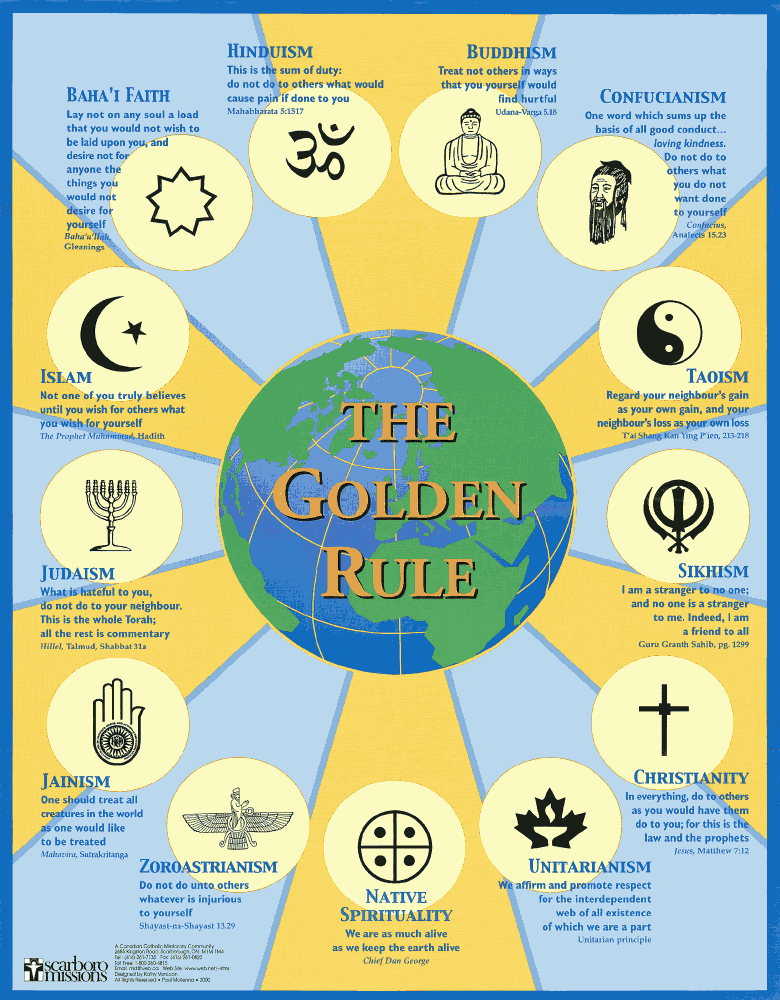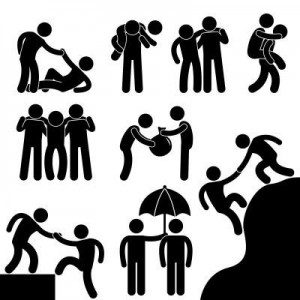Most all of the world religions share a common teaching to not harm others – “the Silver Rule.” “What is hateful to you, do not do to your fellow: this is the whole Torah; the rest is the explanation; go and learn.” – Rabbi Hillel That’s one of the many teachings among the world religions that state this in “the negative.”
Two religions, Christianity and Jainism, state it in the positive teaching to pro-actively do good to others. As Jesus put it, “do unto others as you’d have them do unto you” – the “Golden Rule.”
Many people conflate the two rules and simply assert that they’re all “the Golden Rule.” But you’ll notice that teachings are in fact different. One is a passive call to avoid harming others, the other is a call to be pro-active in seeking to help others.
 See chart full size.
See chart full size.
Some people today now suggest that an “even better” ethic might be to “treat others as they wish to be treated” – and have dubbed this the Platinum Rule.
Regardless, I just came across an article in The Journal of Religion and Business Ethics which examines the Golden Rule (doing unto others as we’d have them do unto us) and deems it “unfit, unwise, and harmful for business ethics.” What are we to make of this?
The article holds the premise that “the Golden Rule makes no sense without an afterlife.” Many progressive Christians are agnostic about an afterlife or at least don’t consider it to be a priority of the faith; e.g., “I don’t follow Jesus in order to go to heaven when I die — or conversely, to avoid going to hell. That’s a cheap form of faith that is really nothing more than fire insurance. I follow Jesus here and now for the sake of experiencing salvation (which means “wholeness” and “healing”) here and now – and to help others do the same.” source
Here’s the abstract and a link to the article.
“The Golden Rule from the Sermon on the Mount in the Bible instructs: “Do unto others as you would have them do unto you”. This is generally acclaimed as a rule of great wisdom and significant social impact. But the widespread popularity of the rule is accompanied by vagueness concerning its interpretations. Given the authority of Jesus, there is one interpretation of particular interest. The Golden Rule differs from what has been called the silver rule, the principle of reciprocal balance advocated by Confucius, Cicero and others. The Golden Rule does not advocate reciprocity, but generosity also toward persons who behave egoistically without restraint. Is this a good social rule? How should we explain the rationale behind such a radical suggestion? The article concludes that the Golden Rule loses its rationale without religious assumptions about a life after death, and is a destructive thesis for business ethics.”
An excerpt from the article.
“People friendly to the Golden Rule ought to acknowledge that it as probably the most hostile text, in all categories, to the ethics of reciprocity. Such an exceptionally harsh attack should not simply be seen as inspiring rhetoric,good intentions or divine instruction.The Golden Rule differs from what is called the Silver Rule, the principle of reciprocal balance advocated by Confucius, Cicero and many others. The Silver Rule builds on thinking that your behavior is dependent on the behavior of the other person; her good deeds should be rewarded, but not her negative deeds. Social and personal benefits of this rule can be expected. In contrast, the Golden Rule stresses rewarding bad conduct; behaving nicely towards those who misbehave is its central message. The consequences of following the Golden Rule are against the the interest of the agent as well as for the community except then for the cheater…”
What do you think? Is pro-actively doing unto others as we’d have them do unto us bad for business? Does it lead to societal collapse?
Discuss.
I’ll weigh-in by saying that Christianity rejects the conventional notions of “social contracts” and “transactional relationships” (p. 157 “Kissing Fish”) as being what full, mature, human life is about. Reducing humans to automotons who seek their self-interests primarily may be what Ayn Rand was about, but Christians are called to not live primarily according to the ways of the world/the market. We’re invited to own that our ways seem foolish from a worldly view and we’re to reject conventional worldly imperial values and to instead embrace the and nurture the other-oriented values that manifest the kingdom/kindom/beloved community of God.
Finally, while it may seem utterly illogical, Jesus’ call to love our enemies, not respond with hate when we experience hate — the only effective way to transform our world for the better is through pro-active, unconditional love. Got an issue with Democrats/Republicans…? Hug one. Help them out. Be pro-active about it. There is no other way.


Christianity; i.e., the spread of Christian values, may’ve played a role in the collapse of the Roman Empire. Was this a bad thing?
Discuss.
xx – Roger
Rev. Roger Wolsey is an ordained United Methodist pastor who directs the Wesley Foundation at the University of Colorado at Boulder, and is author of Kissing Fish: christianity for people who don’t like christianity












